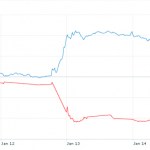illumina
In the last century infant mortality has declined precipitously in the Western world, thanks in large part to the development of antibiotics and vaccination. Yet as the suffering and death from infectious disease has reduced, the burden from genetic disease has become proportionately greater: currently around 20% of all infant deaths in developed countries are a result of inherited Mendelian (single-gene) disorders.
What can be done to reduce this burden? Increasingly sophisticated methods for detecting disease in embryos during pregnancy will help, and these have recently taken another step…
Software company 5AM Solutions has just launched a neat little FireFox plug-in for customers of consumer genomics company 23andMe.
The idea is very simple:
Download your raw data from 23andMe (or use one of the files from me or my colleagues at Genomes Unzipped);
Install the plug-in from here and point it to your 23andMe data;
Browse to a website discussing one of the genetic variants included on the 23andMe chip, and you'll see highlights around the rsID of any variant on the page (rsIDs are unique codes assigned by dbSNP to most of the common variants targeted by…
As part of his Gene Week celebration over at Forbes, Matthew Herper has a provocative post titled "Why you can't have your $1000 genome". In this post I'll explain why, while Herper's pessimism is absolutely justified for genomes produced in a medical setting, I'm confident that I'll be obtaining my own near-$1000 genome in the not-too-distant future.
Matt's underlying argument is that while sequencing costs will continue to drop, obtaining a complete genome sequence that is sufficiently accurate for medical interpretation will require additional expenses (increased sequence coverage to…
Late last week I stumbled across a press release with an attention-grabbing headline ("The Causes of Common Diseases are Not Genetic Concludes a New Analysis") linking to a lengthy blog post at the Bioscience Resource Project, a website devoted to food and agriculture. The post, written by two plant geneticists, plays a tune that will be familiar to anyone who has encountered the rhetoric of GeneWatch UK: basically, modern genomics is pure hype perpetuated by scientists seeking grant money and corporations seeking to absolve themselves of responsibility for environmental disasters. …
A reminder to anyone who reads my other blog Genomes Unzipped that we have a reader survey underway there now, which includes some questions about genetic testing experiences and attitudes towards genetics. We're closing the survey to responses this weekend, so if you're an Unzipped reader but haven't had a chance to fill in the survey, please do so now.
Update 30/11/10: 23andMe has extended their 80% discount until Christmas, without a need for a discount code.
Personal genomics company 23andMe has made some fairly major announcements this week: a brand new chip, a new product strategy (including a monthly subscription fee), and yet another discount push. What do these changes mean for existing and new customers?
The new chip
23andMe's new v3 chip is a substantial improvement over the v2 chip that most current customers were run on (the v2 was introduced back in September 2008). Firstly, the v3 chip includes nearly double the…
Back in June I launched a new blog, Genomes Unzipped, together with a group of colleagues and friends with expertise in various areas of genetics. At the time I made a rather cryptic comment about "planning much bigger things for the site over the next few months".
Today I announced what I meant by that: from today, all of the 12 members of Genomes Unzipped - including my wife and I - will be releasing their own results from a variety of genetic tests, online, for anyone to access. Initially those results consist of data from one company (23andMe) for all 12 members; deCODEme for one…
Join Illumina in its quest to discover "What makes you... you?" And to discern why even though people are genetically 99.9 % similar, we look and act so incredibly different!
IlStudents and adults are encouragedto participate in Illumina's interactive Expo exhibit at the USA Science & Engineering Festival to answer for themselves these tricky but intriguing questions in genetics, using tools of gene-based science and technology, including series of tests involving eye color, taste and more!
Discover how genetic researchers use genetic markers to study disease and to help improve the…
Jay Flatley, CEO of sequencing giant Illumina, announced at the Consumer Genetics Conference today that the company had reduced the price of its retail whole-genome sequencing service. At $19,500 this still isn't in the realm of an impulse buy for most of us, but it's a long way down from the $48,000 that Illumina offered at the launch of its service, and more than an order of magnitude below the $350,000 price paid for the first ever retail genome.
Illumina's press release notes that bulk orders of 5 or more genomes drop the price to $14,500 per genome, and "[i]ndividuals with…
Zoe McDougall from Oxford Nanopore points me to a press release from Illumina announcing a new era of celebrity genomics:
Illumina, Inc. (NASDAQ:ILMN) today announced that it has sequenced the DNA of American actress Glenn Close, the first publicly named female to have her DNA sequenced to full coverage. The service was completed in Illumina's CLIA certified and CAP accredited laboratory utilizing Illumina's Genome Analyzer technology and following the established process shown at http://www.everygenome.com/. Ms. Close's DNA was sequenced to an average depth greater than 30 fold, providing…
The main theme of this year's Advances in Genome Biology and Technology meeting should come as no surprise to regular readers: sequencing. Generating as many bases of DNA sequence as quickly, cheaply and accurately as possible is the goal of the moment, and the number of companies jostling to achieve that goal is growing rapidly.
The meeting saw impressive performances from established players in the field, especially Illumina: their new HiSeq 2000 instrument seems to have dug in as the platform of choice for generating vast amounts of high-quality short-read data. Life Technologies…
I've been remiss in blogging from the Advances in Genome Biology and Technology meeting here in Marco Island, Florida, primarily due to some panic-stricken last-minute changes to the slides for my own presentation last night.
Fortunately the conference has been extremely well-covered by others: Sanger colleague Luke Jostins has blog posts up summarising day 1 and day 2 of the meeting; Dan Koboldt from MassGenomics has his first impressions and a review of the cancer genomics session; and Anthony Fejes is continuing the tradition of publishing extensive notes on every talk he attends. …
Keith Robison has a perceptive piece riffing off the recent Illumina instrument launch, and ponders whether 2010 will be the year that array-based genomic technologies finally start to die off with the rise of sequencing.
The market certainly seems to think so. Check out the immediate effect on stock prices for Illumina (ILMN) and array manufacturer Affymetrix (AFFX) following the Illumina announcement (both normalised to 0 at the start of the graph):
This comes in the context of long-term stagnation of AFFX stock, while Illumina has exploded over the last five years. Illumina made plenty…
The big news from the JP Morgan investment conference today is the announcement of a brand new shiny sequencing machine from Illumina, the HiSeq 2000. The new machine boasts an impressive set of statistics, and looks likely to gradually replace Illumina's GAIIx as the workhorse of most modern sequencing facilities.
So, how excited should we be?
Let's be clear about this up front: this new machine, while impressive, represents an incremental advance rather than a dramatic technological leap forward. This is still second-generation sequencing, generating relatively small snippets of DNA…
Kevin Davies from Bio-IT World has two interviews up today relevant to new DNA sequencing technologies.
Firstly, there's an excellent interview with Clive Brown, vice president of development and informatics for Oxford Nanopore Technologies - one of the most promising contenders in the rapidly evolving third-generation DNA sequencing market. Brown is renowned for his plain-speaking approach (in the article he's described as "the most honest guy in all of next-gen sequencing", a quote originating from David Dooling), and that shows here in his blunt comments on the recent Helicos genome…
Sequencing giant Illumina has announced that it has delivered its first commercial personal genome sequence. The sequence was generated by the genome sequencing service launched by Illumina back in June, and was delivered in collaboration with new personal genomics company Pathway Genomics.
Illumina's genome sequencing service costs $48,000, and its first customer was entrepreneur Hermann Hauser. Bio-IT World summarises details of the sequencing itself:
Illumina completed the sequence at its CLIA-certified laboratory, producing more than 110 billion base calls, good for 30X coverage of the…
Complete Genomics is finally back on the road towards fulfilling its promises of $5000 human genome sequences, after delays in obtaining funding for a massive new facility pushed back its plans by six months. The $45 million in funding it announced this week will be sufficient to build the new Silicon Valley facility, which the company claims will have the capacity to sequence a staggering 10,000 genomes over the course of 2010.
Complete Genomics is an unusual creature in the second-generation sequencing menagerie: instead of aiming to generate revenue by selling machines to researchers…
I've just discovered a very promising new blog in the genomics sphere (well, technically it's a newly relaunched blog) run by a group at the University of Birmingham.
Two posts by Nick Loman are of immediate interest to readers here. Firstly, I highly recommend Nick's thorough dissection of accusations made by Applied Biosystems' Kevin McKernan in a recent submission to a UK House of Lords enquiry, which include the claim that the Sanger Institute's adoption of technology from AB competitor Illumina were driven by bias. Here's a key paragraph, but if you're interested in the…
I notice that Fortune has a story on personal genomics up, Genetic sequencing gets personal Biotech firm Illumina will sequence your entire genetic code -- and throw in a Mac -- for $48,000:
So far, personalized genomics make up just a small fraction of Illumina's revenue. High costs keep sequencing out of reach for most people. But prices will fall substantially as the technology improves. In fact experts say costs could reach $1000 within three to five years, making more people privy to their entire genetic code.
...
One area Illumina is not diving into is sequence analysis. Instead, it is…
The buzz leading up to this week's Consumer Genetics Show in Boston suggested that a major announcement would be made by the CEO of genomics technology provider Illumina, Jay Flatley. Illumina provides the most popular second-generation sequencing instrument currently on the market, the Genome Analyzer II, and has been making noises about moving into the personal genomics industry since at least the beginning of the year, so the announcement itself was not exactly a shock: Illumina is launching a personal genome sequencing service.
The launch comes with a new website, the appealingly titled…


